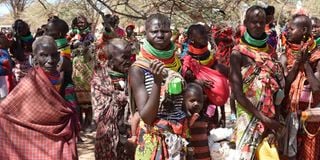Women suffer in search of water as drought bites

Locals wait for their rations of relief food distribution by President William Ruto to hunger victims due to drought, at Nakaalei in Turkana County on November 5, 2022.
For a majority of women in communities in the semi-arid North Rift counties, putting food on the table has become an arduous task thanks to climate change.
The climate crisis, which has resulted in a prolonged drought, has made the search for water for domestic use a difficult task, with women now spending an entire day trekking tens of kilometres in search of water.
Ms Faith Ekwuam, 20, from Namalacha village in Turkana West tells us they spend nights on the road in search of water.
“Women are supposed to provide food and water to the family. We are therefore forced to trek many kilometres in search of water. The majority of the boreholes have dried up and it is now common for us to spend the night outside searching for water,” she says.
“Usually we rely on holes dug in dry river beds commonly known as laggas, but due to the prolonged drought, getting water from them is risky because the sand might cave in. We now rely on boreholes that are solar-powered but accessing them is a challenge,” she adds.
Ms Ekwuam says that since fetching water is usually the work of women and girls, it impedes their participation in educational and other productive economic activities.
Access to water is a huge challenge in the county, with only approximately 40 per cent of the population having access to the commodity and the majority of these are in urban centres.
Another resident, Ms Josephine Akai, says that due to the worsening droughts, the nearest source of water is over 25 kilometres away in many instances.
“For many years, we have had the misfortune of learning first-hand the anguish that scarcity of water brings. The prolonged drought has made our living conditions unbearable,” she says.
“We walk many kilometres every day in search of water on empty stomachs and in the searing heat,” she adds.
She explains that breastfeeding mothers are forced to leave their young children alone as they trek in search of water. Not even pregnant women are spared.
Acute malnutrition numbers
According to the March 2019 Kenya Food and Nutrition Situation Seasonal Assessment report, over 54,000 children under the age of five years are suffering from acute malnutrition in Turkana County. It further shows that 14,420 of them are severely malnourished and in need of urgent treatment.
It also indicates that the nutrition situation in the county remains at a critical level, with the Global Acute Malnutrition (GAM) level among infants and young children falling in the range of 15 to 29.9 per cent. According to the World Health Organization, this should be less than 5 per cent. A GAM value of more than 10 per cent indicates an emergency.
In neighbouring Samburu County, the situation is no different as women grapple with acute water scarcity. Ms Doris Lekulal says they usually cover over 15 kilometres a day to access water, which is impeding their socio-economic development.
“Among our communities, other than providing for our families, we are also supposed to build houses and because the search for water is challenging we bear the greatest challenge,” said Ms Lekulal from Nkaisiraruai village in Samburu Central.
Mr Joseph Lenaltulei from Kisima village says because of the drought, they travel over 100 kilometres with their animals in search of water.
To help alleviate the situation, the Kerio Valley Development Authority has constructed water pans and boreholes worth Sh100 million in Turkana, Baringo, Samburu and Elgeyo-Marakwet counties. Managing Director Sammy Naporos told the Nation the water projects will provide more than 50,000 households with water for both domestic and agricultural use.
“What we have done is a drop in the ocean, the aim of the projects is to build the resilience of the communities against climate change,” he said.
He added that many women around the boreholes have teamed up to establish kitchen gardens.





